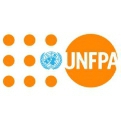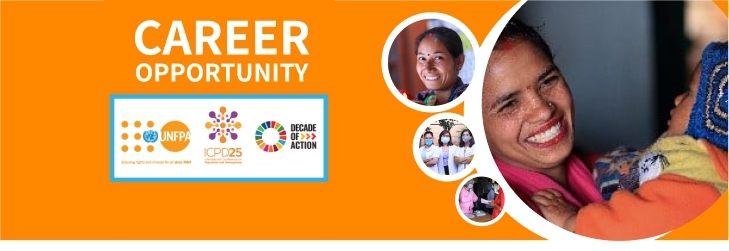


UNFPA, the United Nations Population Fund, is a voluntary-funded international organization with a presence in over 150 countries, including Nepal. UNFPA is guided by the Programme of Action of the 1994 Cairo International Conference on Population and Development (ICPD) and the Sustainable Development Goals. Its mission is to ensure that every pregnancy is wanted, every childbirth is safe and every young person’s potential is fulfilled.
The work of UNFPA is based on the premise that all human beings are entitled to equal rights and protections. We focus on women and young people because these are groups whose ability to exercise their right to sexual and reproductive health is often compromised. Our work is informed by an understanding of population dynamics, human rights and cultural sensitivity.
UNFPA in Nepal
UNFPA support to Nepal began in 1971 and has evolved in response to the changing national contexts. The new country programme is aligned to national priorities, the 2030 Agenda for Sustainable Development, the ICPD Programme of Action, the Convention on the Elimination of All Forms of Discrimination against Women, the UNFPA strategic plan, 2022–2025, and the UNSDCF, 2023–2027. The programme aims to contribute to and accelerate achievement of the 2030 Agenda, in particular SDGs 3 and 5 and the three UNFPA transformative results, in line with the Decade of Action.
UNFPA partners with the Government of Nepal, youth and women’s organizations and development partners to advance its mission. Under the 8th Country Programme and in line with its mandate, UNFPA Nepal is working around the following areas:
Sexual and reproductive health and rights: UNFPA is supporting national efforts in Nepal to improve the sexual and reproductive health of the most marginalized adolescent girls and women. The Fund is largely focusing on youth aged 15-24 and the most marginalized women addressing both the demand and supply sides of reproductive health services to improve access to information and services on maternal health, family planning, and sexually transmitted infections, including HIV.
Gender equality: UNFPA’s support to the Government of Nepal under this overarching theme seeks to ensure that vulnerable groups experience greater self-confidence, respect and dignity. We are building national capacity in the health sector to address gender-based violence (GBV), prevent child marriage and other harmful practices, and working to enhance the knowledge and capacity of men, women and communities to GBV.
Adolescents and youth: Investing in young people, especially the vulnerable and the marginalized, is a priority for UNFPA Nepal. The country has a large adolescent and youth population. Nepal is experiencing a demographic window of opportunity, a ‘youth bulge’. Nepali youth face several development challenges, including access to education, employment, gender inequality, child marriage, youth-friendly health services and adolescent pregnancy. Yet, with investments in their participation and leadership, young people can transform the social and economic fortunes of the country. UNFPA Nepal works with the government and partners to advocate for adolescents and youth’s rights and investments, including education, livelihood skills and health, including sexual and reproductive health.
Population dynamics: Population megatrends at the national and sub-national levels in Nepal continued rapid population growth, population aging, urbanization and migration — not only frame the entire development debate, they demand a reconsideration and re-conceptualization of what will be the main challenges for a new Nepal. Without an adequate understanding of how Nepal is changing from a demographic perspective, forward-looking planning and agenda setting will be of little value. Keeping this in mind, UNFPA Nepal is working with the government to ensure that national, sectoral and decentralized policies and plans address population dynamics and the interlinkages with gender equality, poverty reduction, the needs of young people, and reproductive health, including family planning.
UNFPA, the United Nations Population Fund, is a voluntary-funded international organization with a presence in over 150 countries, including Nepal. UNFPA is guided by the Programme of Action of the 1994 Cairo International Conference on Population and Development (ICPD) and the Sustainable Development Goals. Its mission is to ensure that every pregnancy is wanted, every childbirth is safe and every young person’s potential …
Views: 3661 | This job is expired 1 year, 10 months ago
Position: RE-ADVERTISEMENT: Programme Analyst, Sexual and Reproductive Health and Rights (2 Positions)
Closing Date: 27 June 2022 (5.00 pm Nepal Time)
Duration: One year (renewable)*
Contract Type: Fixed-Term
Duty Station: Janakpur/ Dhangadhi
*No expectancy of renewal in accordance with UN Staff Regulation 4.5
Organizational Setting
The Position:
UNFPA works to ensure sexual and reproductive health and rights (SRHR) remain at the very centre of development. The International Conference on Population and Development (ICPD) Programme of Action (PoA) draws a clear connection between reproductive health, human rights and sustainable development. When sexual and reproductive health needs are not met, individuals are deprived of the right to make crucial choices about their own bodies and futures, with a cascading impact on their families’ welfare and future generations. And because women bear children, and also usually bear the responsibility for nurturing them, sexual and reproductive health and rights issues cannot be separated from gender equality. Cumulatively, the denial of these rights exacerbates poverty and gender inequality.
Job Purpose:
The Constitution of Nepal 2015 and the Safe Motherhood and Reproductive Rights Act 2018 protects the sexual and reproductive health rights and choices of women and girls. However, Nepal has one of the highest ratio of maternal deaths in the region (239 per 100,000 live births), an indication of the country’s weak health system. The COVID-19 pandemic has strained the health system further with health resources and capacities diverted from SRH services to address the pandemic. Overall, women and girls from marginalized groups continue to suffer disproportionately from unintended pregnancies, unsafe abortion, maternal deaths and disability, sexually transmitted infections and gender based violence.
UNFPA has had a close working relationship with the Ministry of Health and Population (MoHP) for the last four decades and has contributed to establishing a progressive policy and legislative environment for SRHR; provided technical support to put in place SRH protocols and guidelines; invested in developing health systems including human resources and supply chain management for SRH; and provided SRH commodities to the Government of Nepal.
Main Tasks & Responsibilities
You would be responsible for:
A. Policy Dialogue and Technical Support
B. Advocacy and Resource Mobilization
C. Programme Management and Coordination
Qualifications and Experience
Education:
Knowledge and Experience:
Required Competencies
Values:
Core Competencies:
Functional Competencies:
Managerial Competencies:
This job has expired.




